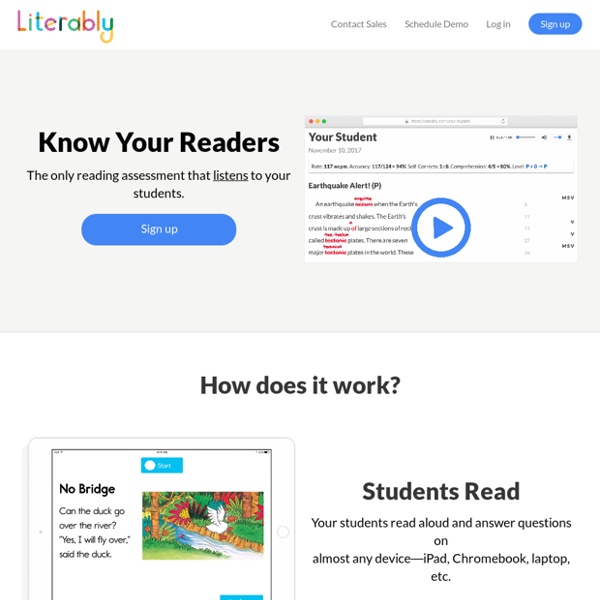



Poetry Editor & Poetry: 10 Ways to Read a Poem 1. Get comfy and enjoy your first reading. Relax into the experience without trying to analyze anything. 2. Read the poem again, this time aloud. Listen for the musicality. 3. 4. 5. 6. 7. 8. 9. 10. © 2015, Mary Harwell Sayler has 3 books of poetry, Outside Eden and Beach Songs & Wood Chimes, published by Kelsay Books in 2014 and, in 2012, Living in the Nature Poem published by Hiraeth Press with an e-book version released in 2014. Learner Sketch Tool The Learner Sketch Tool (LST) is an online tool designed to provide learners with a personalized profile and strategies to improve learning outcomes, and educators with information and strategies for strengths-based conversations that support every learner’s growth and success. The LST is designed to engage learners in an interactive manner and provide information that is immediately practical and useful, increasing successes and empowering students to be advocates of their own learning. Teachers are able to utilize the tool to view an individual student’s self-reported Learner Sketch as well as a group’s composite self-reported strengths and challenges, and access instructional strategies to complement strengths and accommodate/address challenges.
Foundational Reading and Language Standards Resources Package for Grades 3-5 | EL Education The EL Education Common Core–aligned ELA modules for grades 3–5 were designed to helpteachers build students’ capacity to read, think, talk, and write about complex texts. The modules fully address the reading standards for both literary and informational texts, the writing standards, and the speaking and listening standards. Foundational reading and language also are addressed within the context of the module lessons; these standards are more heavily emphasized in specific modulelessons within Module 2B. However, the 60-minute module lessons alone do not represent enough time to comprehensively meet the Foundational reading and language standards. Download this resource to read the full text.
CommonLit Added a Guided Reading Mode for Students CommonLit is a free service that offers a large collection of fiction and nonfiction texts paired to reading questions. You can create a classroom on CommonLit in which you can monitor your students' progress through the texts that you assign to them. Recently, CommonLit added a new feature that they call Guided Reading Mode. When you enable Guided Reading Mode your students will see questions appear in the margin of the documents. Students have to answer those questions correctly in order for the next section of the document to appear. See the Guided Reading Mode in action in the video embedded below. Applications for Education CommonLit has been a favorite resource of mine for a couple of years because of the nature of the thematic questions they provide for thought and discussion.
Unstuck Children's Library : Free Books : Free Texts Publisher's chromolithographed pictorial wrappers favoritefavoritefavoritefavorite ( 22 reviews ) Topics: Brothers and sisters, Orphans, Conduct of life, Education California Digital Library by Crane, Thomas, b. 1843?; Houghton, Ellen Elizabeth, 1853-1922 texts eye favorite 147 comment 7 Osborne Coll. favoritefavoritefavoritefavorite ( 7 reviews ) Topics: Poetry of places, France -- Description and travel Juvenile literature NY3 favoritefavoritefavoritefavorite ( 5 reviews ) Topic: Drawing -- Study and teaching by Baum, L. favorite 101 comment 2 Publisher's green and red illustrated cloth over boards; illustrated endpapers. by Dalziel, Edward, 1817-1905; Dalziel, George, 1815-1902 favorite 67 comment 11 Publisher's peach wrappers, printed in red, blue, and black favoritefavoritefavorite ( 11 reviews ) Topic: Conduct of life NY3 favoritefavoritefavoritefavoritefavorite ( 1 reviews ) Topic: Drawing -- Study and teaching by Ségur, Sophie, comtesse de, 1799-1874; Sterrett, Virginia Frances favorite 139
EasyTestMaker Literably: Your First Class Once upon a time, there was an elephant who lived in the palace stables. He was the king's favorite elephant, so he was always well fed and cared for. Outside the palace walls, a dog lay in the dirt-- starving. Comprehension: 1. A. 2. A. 3. A. 4. A. 5. A. "Today's the big day," said Ruth. 1. A. 2. A. 3. A. 4. A. 5. A. I'm in the middle of three. 1. A. 2. A. 3. A. 4. A. 5. A. Last summer my daddy sent me to the store for a box of macaroni-and-cheese and two tomatoes, and I came back with a dog. 1. A. 2. A. 3. A. to get some orangesB. to thank the managerC. to knock over the managerD. to see what's on top of the display 4. A. 5. A. Abba Jacob was a monk who lived on an island in a faraway sea. 1. A. to take care of the islandB. to take care of SnookC. to drive to visit his neighborsD. to pray and work 2. A. 3. A. 4. A. 5. A. faithfulB. impatientC. lazyD. elderly On the first afternoon of summer vacation, Lena and I made a ropeway between our houses. 1. A. 2. A. 3. A. 4. A. 5. A. 1. A. 2. A.
Abracadabra